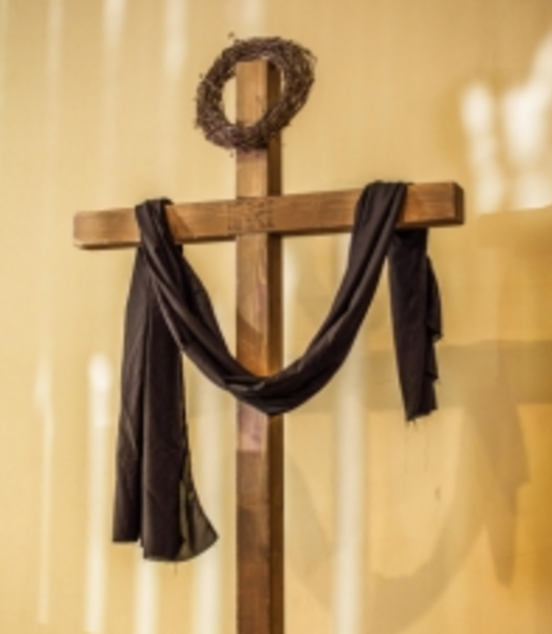The Cross

and being as all men are, he was humbler yet, even to accepting death, death on a cross. (Philippians 2:7-8)
The cross, the symbol of the Christian faith, has been the subject of much theological discussion through the ages. In the early church, Origen and others thought that Jesus’ death was a ransom sacrifice paid by God to Satan to repay the debt of original sin on human souls. The redemption of Christ was in effect a ‘buying back’ of our souls, an appeasement for a Father ‘offended’ by our sin. Anselm refined this idea with the concept of atonement – Christ’s death makes amends for and frees us from our sins and reconciles us to the Father. Aquinas later taught that ‘Christ bore a satisfactory punishment, not for his, but for our sins.’ Hence we can say ‘Jesus died for our sins’.
In recent years theologians have begun to look critically at such ideas. This traditional theology casts the Father as rather ‘small minded’, unable or unwilling to forgive our sins without some sacrifice from his Son. Instead of seeing the saving work of God as happening at all times and everywhere, the atonement sees it as a one-off event, a payment required by a Father who demands some sort of retribution. This idea of a ‘punishing Father’ can make people fearful of God.
Many now see the crucifixion not as a necessary ‘punishment’ for our wrongdoing but a supreme act of sacrificial love which highlights the reason Jesus came to us – to heal rather than condemn, to show us the depth of his love, to show us the route from sin to life, from darkness to light. In effect Jesus is saying on the cross, ‘look how much I love you’. The cross is a symbol of love not punishment. This love is freely given to us and is not earned by some kind of bargain with the Father. God’s healing love and forgiveness is not paid for, it is always free and given abundantly.
By his death on the cross Jesus tells us that our pain is his pain, every act of suffering we experience is also His. Hence we are never alone in our pain, our grief, our death. Jesus does not passively watch our pain and suffering from a distance; he is in our suffering, by our side, in our pain. He is the God of everyone who suffers. And knowing that he suffers with us, and in us, gives us the opportunity to turn suffering into love, pain into hope, death into resurrection. Just as Jesus surrendered to his suffering, at times we too will be called to the cross, called to sacrifice and surrender in love as we experience our own moments of pain and loss. By understanding how love conquers death on the cross, and by uniting our suffering with his, we begin to glimpse the Light of Love in our own pain and darkness.
Jesus, fully man, flesh and blood, suffers on the cross to tell us that whatever we endure, he has endured, he is with us in our pain, and there is a loving liberation and a healing resurrection close at hand. The cross does save us, it does free us from sin, but not perhaps in the way we once thought.
~~~~~~~~~~~~~~~~~~~~

